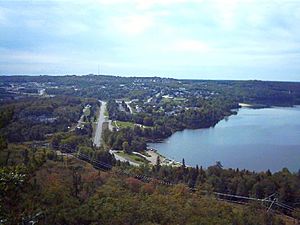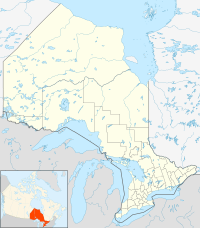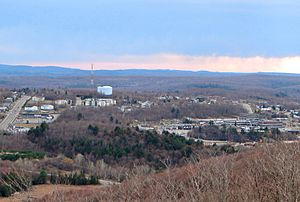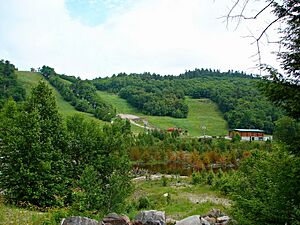Elliot Lake facts for kids
Quick facts for kids
Elliot Lake
|
|
|---|---|
| City of Elliot Lake | |

The city of Elliot Lake; the lake on the right
|
|
| Country | Canada |
| Province | Ontario |
| District | Algoma |
| Established | 1955 |
| Area | |
| • Land | 714.65 km2 (275.93 sq mi) |
| Population
(2021)
|
|
| • Total | 11,372 |
| • Density | 15.9/km2 (41/sq mi) |
| Time zone | UTC-5 (Eastern Standard Time (EST)) |
| • Summer (DST) | UTC-4 (Eastern Daylight Time (EDT)) |
| Forward sortation area |
P5A
|
| Area code(s) | 705 / 249 |
| Highways | |
| Website | www.cityofelliotlake.com |
| Municipal rank: 325th in Canada | |
Elliot Lake is a city in Algoma District, Ontario, Canada. It is located north of Lake Huron. The city is about halfway between Sudbury and Sault Ste. Marie in the Northern Ontario region. Elliot Lake was once known as the "uranium capital of the world." Today, it is a growing place for advanced manufacturing, forest work, and tourism. It is also a popular spot for retirement living and remote work.
Contents
History of Elliot Lake
Before the city was built, a seasonal Ojibwa village existed along the lake's shore. The city gets its name from the lake itself. No one knows for sure how the lake got its name. The name first appeared on a map in 1901. Elliot Lake became an official city in 1990.
Uranium Mining in Elliot Lake
Elliot Lake was created in 1955 as a planned community for the uranium mining industry. The city grew very quickly. By the late 1950s, about 25,000 people lived there. Geologist Franc Joubin and financier Joseph Hirshhorn helped start the city. The main mining companies were Denison Mines and Rio Algom.
The city's population changed a lot over the years. It went through "boom-and-bust" cycles. This means the population grew when mining was strong and shrank when it was not. By 1958, there was too much uranium in the world. This caused problems for Canadian mines.
In the 1970s, the city grew again. This was because of plans for new nuclear reactors. But by the early 1990s, the uranium mines closed. This was due to low prices and less uranium available.
Former Uranium Mines
Many uranium mines operated in the Elliot Lake area. Some of the major ones included:
- Stanleigh Mine (1956–1960 and 1982–1997)
- Spanish American Mine (1957–1959)
- Can-Met Mine (1957–1960)
- Milliken Mine (1957–1964)
- Panel Mine (1957–1961 and 1978–1990)
- Denison Mine (1957–1992)
- Stanrock Mine (1958–1960 and 1964–1985)
- Quirke Mine(s) (1955–1961 and 1965–1990)
- Pronto Mine (1955–1970)
- Buckles Mine (1956–1960)
- Lacnor Mine "Lake Nordic" (1956–1960)
- Nordic Mine (1956–1970)
Health and Environmental Concerns from Mining
In 1974, uranium miners were worried about lung cancer. They felt their employers were not helping sick workers. About 1,000 miners went on strike. This strike led to a special study called the Ham Commission. This study helped create Canada's Occupational Health and Safety Act in 1979. This law helps keep workers safe.
Experts say that radiation in the environment needs to be watched forever. This is because of the mining history. Companies like Rio Algom Limited still monitor the old mine sites.
Elliot Lake After Mining
After the mines closed, Elliot Lake found new ways to grow. The city became known as a place for people to retire. It also became a center for advanced manufacturing and tourism.
On June 23, 2012, part of the roof at the Algo Centre Mall collapsed. This sad event killed two people. A new mall, Pearson Plaza, has since opened.
On February 21, 2019, part of the roof of the Lester B. Pearson Civic Centre also collapsed. This was due to heavy snow. The building was later taken down.
Today, Elliot Lake's economy is growing. Many companies operate here. These include mining services, manufacturing, and forestry businesses. There are also many government offices, a hospital, and schools.
The city has several shopping areas. These are Downtown, Highway 108 Corridor, Hillside, and Paris. There are also two industrial parks. The new Pearson Plaza mall opened in 2016.
In January 2023, the mayor, Chris Patrie, was removed from office. This was because he broke rules about conflict of interest. He had tried to get a new recreation center built near a property he partly owned. The city is working to fill the mayor's position. Andrew Wannan is currently serving as acting mayor.
Geography and Environment
Elliot Lake is located on the Canadian Shield. This means it is surrounded by thick forests, swamps, and many lakes. There are also winding rivers and hills made of old rock. The forests have both leafy and evergreen trees. They look very colorful in the autumn.
The area is home to many animals. You might see moose, white-tailed deer, black bears, beavers, loons, and Canada geese. Many types of fish live in the lakes, such as lake trout, speckled trout, and smallmouth bass.
Since 1990, the Elliot Lake Research Field Station has been here. It was set up by Laurentian University. Scientists there study environmental radioactivity.
Climate in Elliot Lake
Elliot Lake has a humid continental climate. This means it has warm, rainy summers with cool nights. Winters are long and very cold, with lots of snow. It rains or snows a lot throughout the year.
| Climate data for Elliot Lake Airport (1981–2010) | |||||||||||||
|---|---|---|---|---|---|---|---|---|---|---|---|---|---|
| Month | Jan | Feb | Mar | Apr | May | Jun | Jul | Aug | Sep | Oct | Nov | Dec | Year |
| Record high humidex | 6.2 | 10.0 | 18.0 | 32.1 | 36.0 | 44.0 | 42.3 | 43.0 | 36.2 | 32.2 | 18.5 | 10.1 | 44.0 |
| Record high °C (°F) | 8.0 (46.4) |
10.0 (50.0) |
17.8 (64.0) |
25.5 (77.9) |
31.2 (88.2) |
32.4 (90.3) |
34.0 (93.2) |
34.5 (94.1) |
30.9 (87.6) |
25.4 (77.7) |
18.0 (64.4) |
13.0 (55.4) |
34.5 (94.1) |
| Mean daily maximum °C (°F) | −6.2 (20.8) |
−3.7 (25.3) |
1.7 (35.1) |
9.8 (49.6) |
16.7 (62.1) |
22.1 (71.8) |
24.0 (75.2) |
23.2 (73.8) |
18.6 (65.5) |
10.8 (51.4) |
3.6 (38.5) |
−3 (27) |
9.8 (49.6) |
| Daily mean °C (°F) | −10.9 (12.4) |
−8.8 (16.2) |
−3.6 (25.5) |
4.5 (40.1) |
11.1 (52.0) |
16.5 (61.7) |
18.6 (65.5) |
17.8 (64.0) |
13.5 (56.3) |
6.5 (43.7) |
0.1 (32.2) |
−7 (19) |
4.9 (40.8) |
| Mean daily minimum °C (°F) | −15.6 (3.9) |
−13.8 (7.2) |
−8.8 (16.2) |
−0.8 (30.6) |
5.4 (41.7) |
10.8 (51.4) |
13.1 (55.6) |
12.3 (54.1) |
8.4 (47.1) |
2.1 (35.8) |
−3.4 (25.9) |
−10.9 (12.4) |
−0.1 (31.8) |
| Record low °C (°F) | −37 (−35) |
−33 (−27) |
−32 (−26) |
−15 (5) |
−6 (21) |
−1 (30) |
4.0 (39.2) |
4.0 (39.2) |
−5.5 (22.1) |
−9 (16) |
−21 (−6) |
−32.6 (−26.7) |
−37 (−35) |
| Record low wind chill | −44.6 | −40.3 | −33 | −23.3 | −9.1 | 0.0 | 0.0 | 0.0 | −6.3 | −12.7 | −30.5 | −42.8 | −44.6 |
| Average precipitation mm (inches) | 66.4 (2.61) |
49.8 (1.96) |
63.0 (2.48) |
73.1 (2.88) |
84.9 (3.34) |
84.9 (3.34) |
86.4 (3.40) |
101.7 (4.00) |
102.0 (4.02) |
110.5 (4.35) |
92.8 (3.65) |
93.2 (3.67) |
1,008.8 (39.72) |
| Average rainfall mm (inches) | 17.9 (0.70) |
9.7 (0.38) |
31.3 (1.23) |
62.0 (2.44) |
84.4 (3.32) |
84.9 (3.34) |
86.4 (3.40) |
101.7 (4.00) |
102.0 (4.02) |
107.1 (4.22) |
67.7 (2.67) |
27.6 (1.09) |
782.7 (30.81) |
| Average snowfall cm (inches) | 62.1 (24.4) |
48.7 (19.2) |
35.1 (13.8) |
10.6 (4.2) |
0.61 (0.24) |
0.0 (0.0) |
0.0 (0.0) |
0.0 (0.0) |
0.0 (0.0) |
2.5 (1.0) |
23.4 (9.2) |
76.0 (29.9) |
259.0 (102.0) |
| Average precipitation days (≥ 0.2 mm) | 12.2 | 10.5 | 8.8 | 9.5 | 11.5 | 11.9 | 10.6 | 10.2 | 11.8 | 13.3 | 12.3 | 14.6 | 137.3 |
| Average rainy days (≥ 0.2 mm) | 2.0 | 1.7 | 3.6 | 7.7 | 11.3 | 11.9 | 10.6 | 10.2 | 11.8 | 12.9 | 8.0 | 3.3 | 95.1 |
| Average snowy days (≥ 0.2 cm) | 11.4 | 9.8 | 6.4 | 2.9 | 0.29 | 0.0 | 0.0 | 0.0 | 0.0 | 0.75 | 5.4 | 13.1 | 50.0 |
| Average relative humidity (%) | 81.0 | 77.0 | 66.5 | 55.0 | 51.1 | 55.1 | 56.5 | 57.4 | 61.0 | 64.1 | 76.7 | 82.3 | 65.3 |
| Source: Environment Canada | |||||||||||||
Elliot Lake Population Facts
| Historical populations | ||
|---|---|---|
| Year | Pop. | ±% |
| 1956 | 3,791 | — |
| 1961 | 13,179 | +247.6% |
| 1966 | 7,014 | −46.8% |
| 1971 | 9,093 | +29.6% |
| 1976 | 8,849 | −2.7% |
| 1981 | 16,723 | +89.0% |
| 1986 | 17,984 | +7.5% |
| 1991 | 14,089 | −21.7% |
| 1996 | 13,588 | −3.6% |
| 2001 | 11,956 | −12.0% |
| 2006 | 11,549 | −3.4% |
| 2011 | 11,348 | −1.7% |
| 2016 | 10,741 | −5.3% |
| 2021 | 11,372 | +5.9% |
In 2021, the population of Elliot Lake was 11,372 people. This was a 5.9% increase from 2016. The city has 5,839 homes where people live. The land area is about 696 square kilometers. This means there are about 16.3 people per square kilometer. The average age of people in Elliot Lake in 2021 was 60.4 years old.
| Canada census – Elliot Lake community profile | |||
|---|---|---|---|
| 2016 | 2011 | 2006 | |
| Population: | 10,741 (−5.3% from 2011) | 11,348 (−1.7% from 2006) | 11,549 (−3.4% from 2001) |
| Land area: | 714.65 km2 (275.93 sq mi) | 714.56 km2 (275.89 sq mi) | 698.12 km2 (269.55 sq mi) |
| Population density: | 15.0/km2 (39/sq mi) | 15.9/km2 (41/sq mi) | 16.5/km2 (43/sq mi) |
| Median age: | 57.1 (M: 56.5, F: 57.6) | 54.8 (M: 54.7, F: 54.8) | |
| Total private dwellings: | 6259 | 6245 | 6061 |
| Median household income: | $36,366 | ||
| References: 2016 2011 2006 earlier | |||
Getting Around Elliot Lake
Elliot Lake is somewhat isolated. The main road connecting it to the south is Highway 108. This highway is about 30 km long. It connects to Highway 17, which is part of the Trans-Canada Highway. North of the city, Highway 639 goes for 24 kilometers. It leads to Mississagi Provincial Park and some wilderness lodges.
The Deer Trail Route is a special tourist route. It follows a circle using Highways 17, 108, 639, and 546.
There are no regular flights at the Elliot Lake Municipal Airport. The closest airports with scheduled flights are in Sudbury and Sault Ste. Marie.
Elliot Lake Transit provides bus service every hour. Buses do not run on Sundays or holidays. You can also travel between cities using Ontario Northland bus service.
Arts and Culture
Elliot Lake has several local festivals. These include the Jewel in the Wilderness Festival and the Elliot Lake Arts on the Trail festival.
The city is home to Denison House. This is a hotel and convention center. It used to be a corporate lodge for Denison Mines. You can also visit the Elliot Lake Mining and Nuclear Museum. There are two monuments in the city:
- The Uranium Atom Monument downtown.
- The Miners Memorial Monument on Horne Lake.
You can also visit a scenic lookout at the old fire tower.
Elliot Lake is also a setting in the famous novel No Great Mischief by Alistair MacLeod.
Fun Things to Do in Elliot Lake
Elliot Lake offers many attractions for visitors:
- The Elliot Lake fire tower lookout gives great views of the city.
- Mississagi Provincial Park is nearby for outdoor adventures.
- Visit the Sheriff Creek Wildlife Sanctuary.
- Explore the Voyageur's Trail & Westview Hiking Trails.
- Relax at Spruce and Spine Beaches.
- Enjoy the Bob Stirling XC Ski and Mountain Bike Trails.
- Take the Deer Trail Colours Tour in the fall.
- Check out the Rawhide Lake Conservation Area.
- Attend local events like Arts on the Trail and Uranium Heritage Days.
- Ski at Mount Dufour, which has 2 lifts and 7 trails.
- Learn about the city's past at the Elliot Lake Museum.
Schools in Elliot Lake
Elliot Lake has several schools for different age groups:
- Elliot Lake Secondary School
- Elliot Lake Intermediate School
- Villa Française-des-Jeunes (French school)
- Our Lady of Fatima
- Our Lady of Lourdes
- École Georges-Vanier (French school)
- Esten Park Public School
- Central Avenue Public School
Sports and Recreation
Elliot Lake offers many sports and outdoor activities:
- Elliot Lake ATV Club
- Stone Ridge Golf & Country Club
- Mount Dufour Ski Area
- Mountain Bike Ontario Cup Race
- The Jewel in the Wilderness Ontario Cup Road Race
- Tri-it in the Wilderness Triathlon
- Bell Ididarace Sled Dog Race
- Deer Trail Scenic Touring Route
- Elliot Lake Tennis Club
- Voyageur Hiking Trail
Hockey in Elliot Lake
Elliot Lake has a strong hockey history with several teams:
- Elliot Lake Vikings (NOJHL) (2023–present)
- Elliot Lake Red Wings (NOJHL) (2021–2023)
- Elliot Lake Wildcats (NOJHL) (2014–2020)
- Elliot Lake Bobcats (GMJHL/NOJHL) (2007–2014)
- Elliot Lake Vikings (NOJHL) (1965–1999)
- Elliot Lake Minor Hockey Association
- Elliot Lake Major Hockey Association
In March 2024, Elliot Lake won the Kraft Hockeyville contest! They won a nationwide vote. This means they received $250,000 for repairs at the Centennial Arena. They also get to host an NHL preseason game in the fall of 2024.
Other Sports
- Baseball: Elliot Lake Fireside Heat, Elliot Lake Minor Fastball Association
- Martial Arts: Korean Martial Arts Centre (KMAC), Hapkido Kids Inc.
- Softball: Elliot Lake Mixed Slow-pitch (Adult and Youth), Elliot Lake Ladies Slow-Pitch (Adult)
- Swimming: Elliot Lake Aquatic Club (ELAC)
Media in Elliot Lake
Print Media
The Elliot Lake Standard is the city's newspaper. Elliot Lake Today is a local news website. The North Shore Bulletin is a bi-weekly advertising flyer that also shares local news.
Radio Stations
Elliot Lake has one local commercial radio station. Other radio services are rebroadcasts from Sudbury.
| Frequency | Call sign | Branding | Format | Owner | Notes |
|---|---|---|---|---|---|
| FM 90.3 | CBEC-FM | CBC Radio One | Talk radio, public radio | Canadian Broadcasting Corporation | Rebroadcaster of CBCS-FM Sudbury |
| FM 94.1 | CKNR-FM | Moose FM | Adult contemporary | Vista Broadcast Group | |
| FM 98.7 | CKNR-FM-1 | Moose FM | Adult contemporary | Vista Broadcast Group | Additional transmitter due to signal problems |
| FM 101.7 | CBON-FM-5 | Ici Radio-Canada Première | Talk radio, public radio | Canadian Broadcasting Corporation | Rebroadcaster of CBON-FM Sudbury |
| FM 102.5 | CJTK-FM-3 | KFM | Christian music | Harvest Ministries Sudbury | Rebroadcaster of CJTK-FM Sudbury |
Television Channels
| OTA channel | Call sign | Network | Notes |
|---|---|---|---|
| 3 (VHF) | CICI-TV-1 | CTV | Rebroadcaster of CICI-TV Sudbury |
Elliot Lake used to have more TV channels. These were CBEC-TV (channel 7) and CBLFT-TV-6 (channel 12). They rebroadcast stations from Toronto. These channels were shut down in 2012.
Famous People from Elliot Lake
- Rick Brebant, hockey player
- Kayt Burgess, writer
- Catharine Dixon, writer
- Christine Girard, weightlifter
- Alex Henry, hockey player
- Korey Jarvis, International wrestler
- Suzanne A. Rogers, socialite
- Jeremy Stevenson, hockey player
- Zack Stortini, hockey player
- Alan Thicke, a famous Canadian-American actor, grew up in Elliot Lake.
See also
 In Spanish: Elliot Lake para niños
In Spanish: Elliot Lake para niños
 | William M. Jackson |
 | Juan E. Gilbert |
 | Neil deGrasse Tyson |




